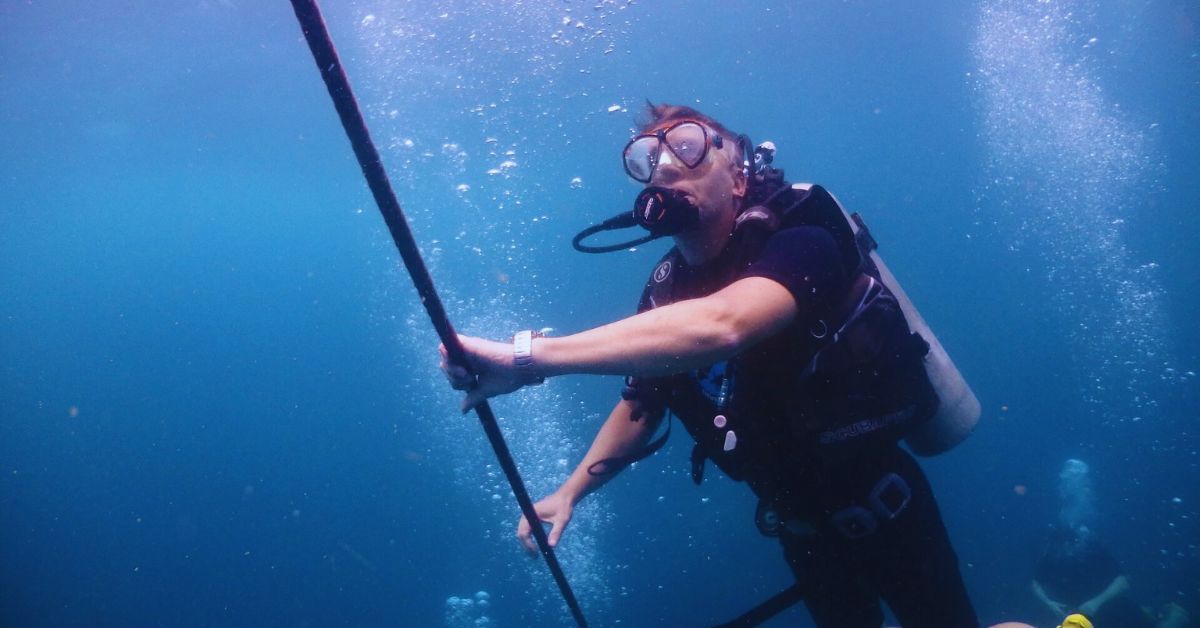Breaking Boundaries: Conquering Fear, One Dive at a Time
Fear is a universal emotion that holds us back from experiencing life to its fullest. Whether it’s the fear of the unknown, deep water, or failure, scuba diving has proven to be a transformative activity for countless individuals worldwide. In this blog, we’ll explore how breaking boundaries through scuba diving can help you overcome fear, build confidence, and unlock a new level of freedom.
Breaking Boundaries: Overcoming Fear Through Scuba Diving is not just about diving—it’s about personal growth, courage, and resilience. If you’ve ever thought, “I could never do that,” this is your sign to challenge that belief and take the plunge.
Why Fear Stops Us: The Psychology Behind It
Fear often originates from the brain’s protective instincts, designed to keep us safe. When confronted with an unfamiliar situation—like scuba diving—our mind triggers “what if” scenarios: What if I run out of air? What if I can’t swim? Understanding this response is the first step toward overcoming it.
Scuba diving provides a structured, safe environment where fears can be addressed gradually. Each small victory, from donning the equipment to taking that first breath underwater, builds confidence and rewires our perception of fear.
How Scuba Diving Helps You Face and Conquer Fear
Immersion in the Unknown
The underwater world forces you to let go of control and trust your training. This surrender is a powerful antidote to fear. With each dive, you learn to navigate the unknown with calmness and composure.
Building Resilience
Scuba diving is not just a sport; it’s a journey. You face challenges like visibility changes, learning buoyancy control, or encountering marine life for the first time. These experiences build mental toughness, teaching you to adapt and thrive in new environments.
A Sense of Accomplishment
Every completed dive is a testament to your courage and ability. For those who’ve struggled with fear, the feeling of surfacing after a successful dive is transformative—it’s proof that you can do hard things.
Real-Life Stories of Fearless Divers
Emily’s Journey: From Thalassophobia to Instructor
Emily, a former office worker, struggled with an intense fear of open water. After joining a Discover Scuba Diving experience during her vacation in Pattaya, she realized her fear stemmed from a lack of understanding. Today, Emily is a PADI Instructor, helping others conquer their fears.
James: Overcoming Claustrophobia
James feared confined spaces, making the idea of wearing a mask and breathing underwater unthinkable. Through patient training and guidance, James now enjoys exploring shipwrecks, finding freedom in the very places he once avoided.
Physical and Mental Benefits of Scuba Diving
Improved Focus and Mindfulness
Underwater, distractions disappear. You focus on breathing, buoyancy, and the beauty around you. This mindful state reduces stress and enhances mental clarity.
Strengthened Physical Fitness
Diving requires stamina, strength, and flexibility. Carrying equipment, swimming against currents, and performing underwater tasks improve overall physical fitness.
Boosted Confidence
Every dive session builds confidence, not just underwater but in all areas of life. Scuba diving teaches you that fears can be overcome with preparation and persistence.
Preparing for Your First Dive: What to Expect
Choosing the Right Training
Opt for a reputable PADI 5-Star Dive Center with experienced instructors who will guide you every step of the way.
The Gear
Modern scuba equipment is designed for comfort and safety. During your initial training, you’ll learn how to use your gear, troubleshoot, and trust it to keep you safe.
The Training Process
Courses like the PADI Open Water Diver program introduce you to key skills in a pool or confined water setting before moving to open water dives. This gradual approach minimizes fear by building familiarity and competence.
Tips to Build Confidence Underwater
Start Slow
Begin your journey with gradual steps to ease into the underwater environment. Start with snorkeling to get accustomed to breathing through a snorkel and observing marine life from the surface. When you’re ready, progress to shallow confined water dives where you can practice basic skills under the supervision of an instructor. Remember, it’s okay to take your time—each step builds your confidence.
Practice Breathing
Controlled breathing is a cornerstone of diving. Take slow, deep breaths to calm your mind and maintain a steady heart rate. This not only helps you relax but also conserves air, allowing for longer and more enjoyable dives. If you feel nervous, focus on counting your breaths or matching them to your movements to stay present and grounded.
Buddy Up
Having a reliable dive buddy can significantly reduce anxiety. A trusted partner offers emotional support and ensures you’re never alone in unfamiliar waters. Before diving, discuss your comfort level and hand signals with your buddy, so you feel aligned and supported. Many divers find comfort in knowing that someone is right there with them every step of the way.
Focus on the Positives
Instead of dwelling on fears or mistakes, shift your attention to achievements. Celebrate each milestone, no matter how small—from mastering mask clearing to perfecting buoyancy control. This positive reinforcement builds self-assurance and motivates you to keep progressing. Remember, every diver starts as a beginner, and each dive is a step closer to becoming more confident.
Visualize Success
Before diving, spend a few minutes visualizing a successful and enjoyable dive. Imagine yourself calmly descending, observing the vibrant marine life, and ascending with a smile. This mental preparation reduces anxiety and creates a positive outlook for the experience.
Ask Questions
Knowledge is power, and understanding the diving process can alleviate many fears. Don’t hesitate to ask your instructor questions about gear, techniques, or potential challenges. Being informed helps eliminate the fear of the unknown and builds trust in your abilities.
Take Refresher Courses
If you’re feeling unsure after a break from diving, a refresher course is a fantastic way to regain confidence. These sessions help you practice essential skills, learn new techniques, and ease back into the water under professional guidance.
Embrace the Learning Curve
Diving is a skill that improves with time and practice. Accept that mistakes may happen—they’re a natural part of the process. Instead of fearing them, view them as opportunities to learn and grow. Each dive adds to your experience, making you a stronger, more capable diver.
Trust Your Training and Gear
The skills and knowledge you gain during dive training are your foundation for success. Trust that your instructors have prepared you to handle common challenges. Additionally, modern scuba equipment is highly reliable and designed with safety in mind. Rely on your training and gear to support you underwater, freeing your mind to focus on the adventure.
Breaking Boundaries as a Certified Diver
Once certified, your possibilities expand. Night dives, wreck dives, and deep dives challenge you further, offering opportunities to overcome fears of darkness, depth, or enclosed spaces. Every new experience reinforces your confidence and capability.
FAQs About Overcoming Fear in Scuba Diving
Q: Is scuba diving safe?
A: Absolutely. Scuba diving is extremely safe when conducted under proper training and by following established safety protocols. Certified dive professionals teach you critical safety skills, such as monitoring air supply and using buddy systems, ensuring you’re prepared for a secure underwater experience. Regular equipment checks and adherence to depth limits further reduce risks.
Q: What if I panic underwater?
A: It’s natural to feel apprehensive at first, but dive training equips you to handle such situations calmly. You’ll learn how to signal for help, ascend safely, and practice techniques to regain composure, such as focusing on slow, controlled breathing. Many divers report that their first moments of fear fade quickly, replaced by excitement and awe.
Q: Can I scuba dive if I can’t swim?
A: Yes, you can. While swimming skills enhance your confidence in the water, many dive programs, like PADI Discover Scuba Diving, cater to beginners and non-swimmers. These courses focus on breathing and basic movements, helping you feel at ease even without strong swimming abilities.
Q: How do instructors help beginners overcome fear?
A: Dive instructors are trained to work at your pace, ensuring you feel comfortable and confident at every step. From detailed pre-dive briefings to shallow water practice sessions, they address your concerns and guide you through gradual skill-building exercises.
Q: What’s the best way to prepare mentally for diving?
A: Visualization techniques and deep breathing exercises can help you prepare for your first dive. Imagine yourself underwater, enjoying the sights and sensations while staying calm. Discuss any fears with your instructor—they’ll provide tailored advice to ease your mind.
Q: What happens if I feel claustrophobic underwater?
A: Feeling confined is a common concern, but open water diving offers vast spaces and freedom. Start in a shallow, controlled environment, such as a pool or calm bay, to adjust to the gear and sensations. With time, most divers find that the weightless feeling and serene surroundings diminish any claustrophobia.
Q: Can diving help with other fears in life?
A: Yes! Diving helps develop resilience and problem-solving skills that extend to everyday life. Overcoming initial fears underwater builds confidence, showing you that fears can be faced and conquered with preparation and practice.
Q: What if I can’t equalize my ears?
A: Equalizing is a skill that takes practice, and dive instructors teach you techniques like pinching your nose and blowing gently to relieve pressure. Ascending or descending slowly and pausing as needed will prevent discomfort, allowing you to continue diving comfortably.
Q: Are there specific dive sites better for beginners with fear?
A: Yes, many dive centers offer beginner-friendly sites with calm waters, good visibility, and minimal currents. Pattaya, for example, has shallow reefs and sheltered locations perfect for gaining confidence in a relaxed environment.
Q: How long does it take to feel confident as a diver?
A: Confidence varies by individual, but most new divers feel comfortable after a few dives. Repetition and continued practice help solidify skills, making you more relaxed with each underwater adventure.
Q: Can scuba diving be used as a form of therapy?
A: Yes, scuba diving has been recognized as a therapeutic activity for conditions such as anxiety, depression, and PTSD. The mindfulness required while diving, coupled with the sense of achievement from conquering fears, promotes mental well-being. Many programs focus on scuba diving therapy to help individuals build confidence, reduce stress, and find inner peace.
Q: How does scuba diving help with stress relief?
A: Scuba diving encourages mindfulness by focusing on controlled breathing and observing the underwater world. The serene environment, combined with the weightlessness of water, helps reduce cortisol levels, alleviate stress, and promote relaxation. Many divers describe the experience as meditative and grounding.
Q: Can scuba diving improve mental health in the long term?
A: Yes, regular scuba diving can have long-term benefits for mental health. It fosters a sense of achievement, boosts confidence, and offers a break from everyday stressors. Divers often form strong social connections within the diving community, which can provide additional emotional support and camaraderie.
Ready to Dive In? Take the Next Step
Are you ready to Overcoming Fear Through Scuba Diving? Scuba diving is more than an adventure—it’s a journey toward self-discovery and empowerment. Contact us today to begin your diving journey! Whether you’re looking for a beginner course or want to become a certified instructor, we’re here to guide you every step of the way.



One Response